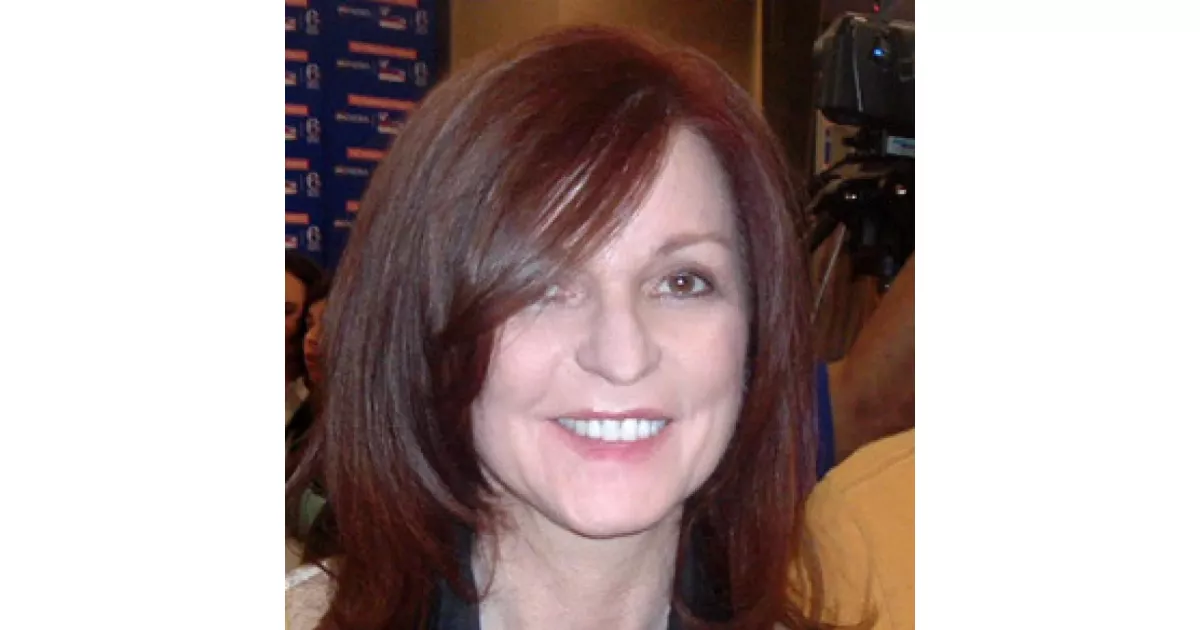Maureen Dowd is an American columnist for The New York Times and an author. She is known for her sharp wit, incisive political commentary, and distinctive writing style. Dowd often focuses on American politics and culture, offering a critical perspective on prominent figures and events. Her columns frequently explore the intersection of politics, gender, and media, contributing to public discourse on contemporary issues. She won a Pulitzer Prize for her commentary in 1999.
January 14, 1952: Maureen Dowd Born
On January 14, 1952, Maureen Brigid Dowd was born. She later became a columnist for The New York Times and an author.
1969: Graduated from Immaculata High School
In 1969, Maureen Dowd graduated from Immaculata High School.
1973: Received B.A. from Catholic University
In 1973, Maureen Dowd received a Bachelor of Arts degree in English from the Catholic University of America, marking the completion of her undergraduate studies.
1974: Entered Journalism at the Washington Star
In 1974, Maureen Dowd began her journalism career as a dictationist for the Washington Star, marking her entry into the field.
1981: Worked for Time After the Washington Star Closed
In 1981, after the Washington Star ceased publication, Maureen Dowd worked for Time, continuing her career in journalism.
1983: Joined The New York Times
In 1983, Maureen Dowd joined The New York Times as a metropolitan reporter, marking a significant step in her journalism career.
1984: Incorrectly stated that 1984 was the last time a male and a woman ran on the Democratic ticket
During the 2020 presidential election, Dowd wrote a column about Geraldine Ferraro, initially stating incorrectly that the last time a man and a woman ran on the Democratic ticket was the Mondale–Ferraro ticket. The New York Times later corrected the column to say that 1984 was the last time a male Democratic presidential candidate chose a woman as his running mate.
1986: Served as Correspondent in Times Washington Bureau
In 1986, Dowd started serving as a correspondent in the Times Washington bureau.
1987: Broke Story of Joe Biden's Plagiarism
In 1987, Maureen Dowd broke the story that Delaware Senator Joe Biden had plagiarized several speeches. This revelation led to the end of Biden's first presidential campaign.
1991: Received Breakthrough Award from Columbia University
In 1991, Dowd received a Breakthrough Award from Columbia University.
1992: Pulitzer Prize Finalist
In 1992, Dowd was a Pulitzer Prize finalist for national reporting, recognizing her work in journalism.
1992: Finalist for Pulitzer Prize
In 1992, Maureen Dowd was a finalist for the Pulitzer Prize in National Reporting, acknowledging her excellence in journalism.
November 1993: Media Matters Analyzed Dowd's Columns About Hillary Clinton
A 2014 analysis by Media Matters of 21 years of Dowd's columns about Hillary Clinton found that of the 195 columns by Dowd since November 1993 containing significant mentions of Clinton, 72 percent (141 columns) were negative towards Clinton.
1994: Won Matrix Award
In 1994, Maureen Dowd won a Matrix Award from the New York Association for Women in Communications, honoring her achievements in the field.
1995: Became Op-Ed Writer
In 1995, Dowd transitioned to become an op-ed writer for The New York Times, allowing her to express her opinions and analysis on a wider range of topics.
1995: Became Columnist for The New York Times
In 1995, Maureen Dowd became a columnist on The New York Times op-ed page, replacing Anna Quindlen.
1996: Named Woman of the Year by Glamour Magazine
In 1996, Dowd was named a Woman of the Year by Glamour magazine.
1999: Received Pulitzer Prize
In 1999, Dowd received a Pulitzer Prize for her series of columns on the Clinton–Lewinsky scandal, recognizing her distinguished commentary.
1999: Won Pulitzer Prize for Commentary
In 1999, Maureen Dowd won the Pulitzer Prize for distinguished commentary, recognizing her contributions to the field of journalism.
2000: Won Damon Runyon Award
In 2000, Dowd won the Damon Runyon Award for outstanding contributions to journalism.
2000: Wrote about Al Gore and the Democratic Party
In the run-up to the 2000 presidential election, Dowd characterized Al Gore as "so feminized and diversified and ecologically correct that he's practically lactating" and referred to the Democratic Party as the "mommy party."
2003: Trump's purported opposition to the 2003 US invasion of Iraq.
Dowd wrote that Donald Trump held dovish foreign policy beliefs, citing his purported opposition to the 2003 US invasion of Iraq.
2004: Received Golden Plate Award
In 2004, Dowd received the Golden Plate Award of the American Academy of Achievement, presented by Neil Sheehan at the International Achievement Summit in Chicago.
2005: First Mary Alice Davis Lectureship Speaker
In 2005, Dowd became the first Mary Alice Davis Lectureship speaker at the University of Texas at Austin.
2007: Ranked on The Daily Telegraph's List
In 2007, Dowd was ranked No. 37 on The Daily Telegraph's list of the 100 most influential liberals in America.
2008: Sexism Towards Hillary Clinton and Sarah Palin in the 2008 election
A 2009 study of sexism towards Hillary Clinton and Sarah Palin in the 2008 election observed that Dowd had disparaged Palin as a "Barbie" over her pageantry past.
2008: Published Article Questioning Hillary Clinton's Tears
During the 2008 Democratic primary, Dowd published an article titled "Can Hillary Clinton Cry Herself Back to the White House?", which a 2016 study said "[serves] to reinforce the stereotype that tears and visible emotions are feminine traits and signs of weakness".
2009: Study Observed Sexism Towards Hillary Clinton and Sarah Palin
A 2009 study of sexism towards Hillary Clinton and Sarah Palin in the 2008 election observed that Dowd had disparaged Palin as a "Barbie" over her pageantry past.
2010: Ranked on The Daily Telegraph's List
In 2010, Dowd was ranked No. 43 on The Daily Telegraph's list of the 100 most influential liberals in America.
2012: Awarded Honorary Doctorate
In 2012, NUI Galway awarded Maureen Dowd an honorary doctorate, recognizing her achievements and contributions.
2013: Jessica Ritchie Argued Portrayals of Clinton as Improper and Unnatural
In 2013, Jessica Ritchie argued that portrayals of Hillary Clinton as a "Terminator" sought to portray her presidential bid as improper and unnatural.
January 2014: Experienced Negative Effects from Cannabis-Infused Chocolate
In January 2014, while touring the legalized recreational cannabis industry, Maureen Dowd consumed about one-fourth of a cannabis-infused chocolate bar. She was later informed that the recommended dose was one-sixteenth of the bar. This resulted in negative experiences which she later wrote about.
March 4, 2014: Published Column Quoting Amy Pascal
On March 4, 2014, Maureen Dowd published a column about the dominance of men in the film industry, quoting Amy Pascal. Leaked emails suggested that Dowd had promised to provide the draft column to Pascal's husband prior to publication.
June 3, 2014: Wrote Op-Ed About Negative Cannabis Experience
On June 3, 2014, Maureen Dowd published a New York Times op-ed describing her negative experiences with legal cannabis.
August 2014: Announced as Staff Writer for The New York Times Magazine
In August 2014, it was announced that Maureen Dowd would become a staff writer for The New York Times Magazine.
September 2014: Wrote Op-Ed Discussing Consumable Cannabis with Willie Nelson
In September 2014, Dowd followed up on her cannabis experience with another op-ed, this time describing a discussion with Willie Nelson about using consumable cannabis.
December 12, 2014: Times Public Editor Addressed Ethics Concerns
On December 12, 2014, Margaret Sullivan, the Times public editor, concluded that Dowd had not acted unethically regarding the column about Amy Pascal, despite 'gushy' email exchanges.
2014: Media Matters Analyzed Dowd's Columns About Hillary Clinton
A 2014 analysis by Media Matters of 21 years of Dowd's columns about Hillary Clinton found that of the 195 columns by Dowd since November 1993 containing significant mentions of Clinton, 72 percent (141 columns) were negative towards Clinton.
2014: Became Staff Writer for The New York Times Magazine
In 2014, Maureen Dowd became a staff writer for The New York Times Magazine, expanding her role within the publication.
2016: Study on Article Questioning Hillary Clinton's Tears
During the 2008 Democratic primary, Dowd published an article titled "Can Hillary Clinton Cry Herself Back to the White House?", which a 2016 study said "[serves] to reinforce the stereotype that tears and visible emotions are feminine traits and signs of weakness".
2016: Penned Op-Ed "Donald the Dove, Hillary the Hawk"
During the 2016 presidential election, Dowd wrote a New York Times op-ed, titled "Donald the Dove, Hillary the Hawk," arguing that Donald Trump held dovish foreign policy beliefs. This was in contrast to reports at the time, and subsequent events during Trump's presidency.
2016: Authored "Donald the Dove, Hillary the Hawk" Op-Ed
During the 2016 presidential election, Maureen Dowd wrote an op-ed for The New York Times titled "Donald the Dove, Hillary the Hawk". This piece was often referenced by critics of Donald Trump's foreign policy.
2017: Study Examined Sexualized Shaming of Monica Lewinsky
A 2017 study stated that in Dowd's writings about Monica Lewinsky, she repeatedly mocked and disparaged her.
2018: Drezner Criticized Dowd's Op-Ed
In 2018, Daniel W. Drezner criticized Dowd's 2016 op-ed, arguing that Trump's foreign policy was clearly hawkish, contradicting Dowd's initial assessment.
2020: Wrote Column with Incorrect Information
During the 2020 presidential election, Dowd wrote a column about Geraldine Ferraro, initially stating incorrectly that the last time a man and a woman ran on the Democratic ticket was the Mondale–Ferraro ticket. The New York Times later corrected the column.
Mentioned in this timeline

Donald John Trump is an American politician media personality and...

Hillary Diane Rodham Clinton is an American politician lawyer and...

The White House located at Pennsylvania Avenue NW in Washington...

Joe Biden a member of the Democratic Party served as...

Willie Nelson is a highly influential American singer guitarist songwriter...

Sarah Palin is an American politician best known for serving...
Trending

11 days ago Dick Vitale and Charles Barkley Team Up for College Basketball Broadcasts This Season

1 month ago Kim Kardashian's 'All's Fair' TV show faces criticism despite Niecy Nash's defense.
10 days ago Marcus Freeman: Notre Dame coach considered for Giants head coaching vacancy in NFL.
Jeremiyah Love is an American college football running back He currently plays for the Notre Dame Fighting Irish He is...

7 months ago Trump's Tariffs Threaten Cannes 2025, SAG-AFTRA Responds, Impacting Spike Lee's Industry.

7 months ago Mitchell Robinson's Playoff Impact: Knicks' Gamble Pays Off as Hart Shines in Game 3
Popular

Candace Owens is an American conservative political commentator and author...

Ilhan Omar is an American politician currently serving as the...

XXXTentacion born Jahseh Dwayne Ricardo Onfroy was a controversial yet...

Tom Cotton is an American politician and Army veteran currently...
The Kennedy Center Honors are annual awards recognizing individuals and...
Matt and Ross Duffer known as the Duffer Brothers are...
